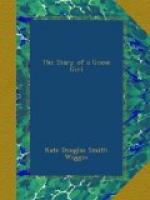* * *
Phoebe has not a vestige of sentiment. She just asked me if I would have a duckling or a gosling for dinner; that there were two quite ready—the brown and yellow duckling, that is the last to leave the water at night, and the white gosling that never knows his own ’ouse. Which would I ’ave, and would I ’ave it with sage and onion?
Now, had I found a duckling on the table at dinner I should have eaten it without thinking at all, or with the thought that it had come from Barbury Green. But eat a duckling that I have stoned out of the pond, pursued up the bank, chased behind the wire netting, caught, screaming, in a corner, and carried struggling to his bed? Feed upon an idiot gosling that I have found in nine different coops on nine successive nights—in with the newly-hatched chicks, the half-grown pullets, the setting hen, the “invaleed goose,” the drake with the gapes, the old ducks in the pen?—Eat a gosling that I have caught and put in with his brothers and sisters (whom he never recognises) so frequently and regularly that I am familiar with every joint in his body?
In the first place, with my own small bump of locality and lack of geography, I would never willingly consume a creature who might, by some strange process of assimilation, make me worse in this respect; in the second place, I should have to be ravenous indeed to sit down deliberately and make a meal of an intimate friend, no matter if I had not a high opinion of his intelligence. I should as soon think of eating the Square Baby, stuffed with sage and onion and garnished with green apple-sauce, as the yellow duckling or the idiot gosling.
Mrs. Heaven has just called me into her sitting-room, ostensibly to ask me to order breakfast, but really for the pleasure of conversation. Why she should inquire whether I would relish some gammon of bacon with eggs, when she knows that there has not been, is not now, and never will be, anything but gammon of bacon with eggs, is more than I can explain.
“Would you like to see my flowers, miss?” she asks, folding her plump hands over her white apron. “They are looking beautiful this morning. I am so fond of potted plants, of plants in pots. Look at these geraniums! Now, I consider that pink one a perfect bloom; yes, a perfect bloom. This is a fine red one, is it not, miss? Especially fine, don’t you think? The trouble with the red variety is that they’re apt to get “bobby” and have to be washed regularly; quite bobby they do get indeed, I assure you. That white one has just gone out of blossom, and it was really wonderful. You could ’ardly have told it from a paper flower, miss, not from a white paper flower. My plants are my children nowadays, since Albert Edward is my only care. I have been the mother of eleven children, miss, all of them living, so far as I know; I know nothing to the contrary. I ’ope you are not wearying of this solitary place, miss?




